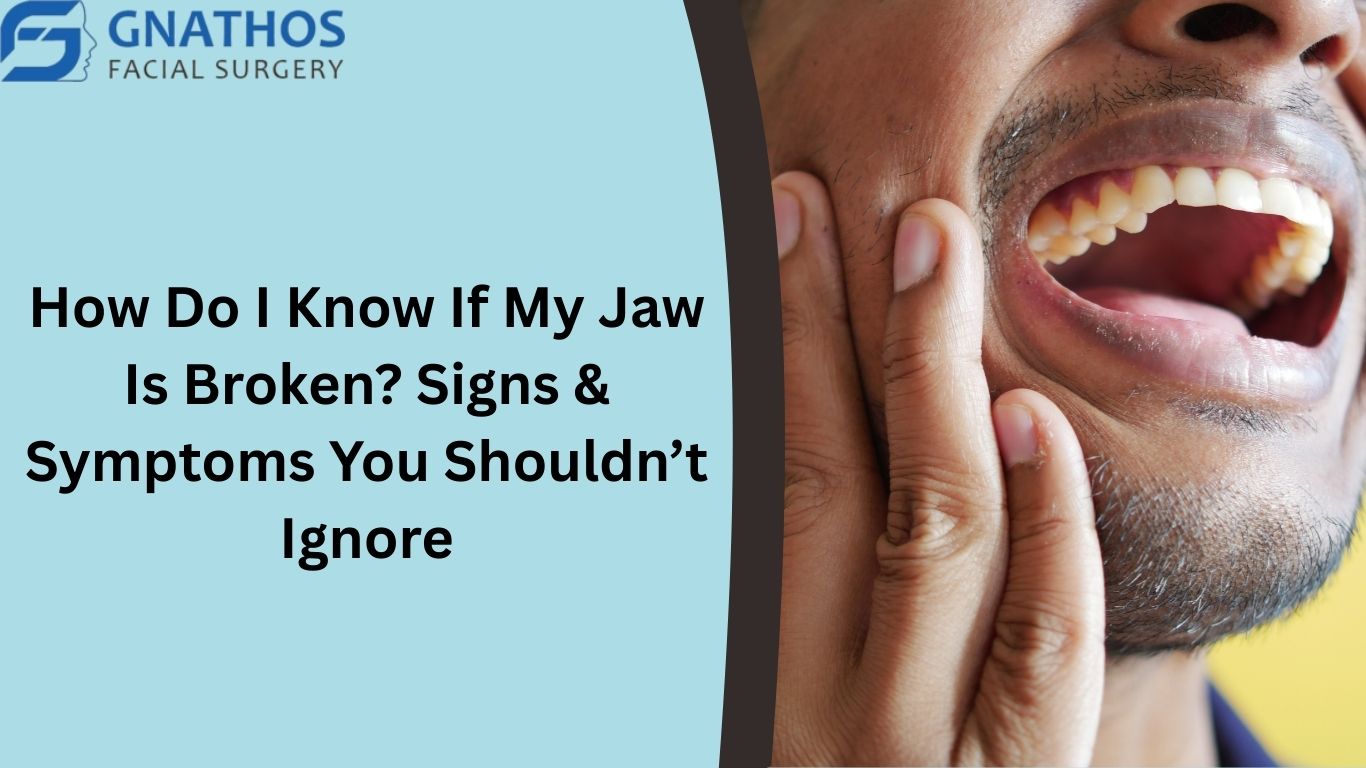You’ve just had a fall, a sports injury, or some kind of unfortunate incident involving a blow to your face. Now, your jaw hurts, and something just feels seriously wrong. Your mind is racing, and you’re asking yourself the most critical question: “How do I know if my jaw is broken?“
It’s a terrifying thought, but it’s one you need to take seriously. Unlike a hairline jaw fracture, which can present with subtle, nagging pain, a broken or fractured jaw is a significant injury that requires immediate medical attention. The good news is that some very distinct signs and symptoms can help you identify a serious problem. Today, we’re going to walk you through a clear, detailed guide on how do I know if my jaw is broken – what those symptoms feel like, what to do immediately, and why getting professional help is absolutely crucial. Let’s get you the information you need to make the right decisions in a stressful situation.
A Quick Anatomy Review: Your Jawbone
Your lower jaw, or mandible, is the largest and strongest bone in your face. It’s shaped like a horseshoe and connects to your skull at the temporomandibular joints (TMJs) just in front of your ears. Because of its prominent position, it’s susceptible to injury. A jaw fracture is a break or crack in the mandible. These fractures can occur in different places: in the body of the jaw, at the angle, or in the condyle (the part that connects to the skull). Fractures can be:
- Simple/Undisplaced: A clean break where the bone pieces are still aligned.
- Displaced: The bone pieces have moved out of alignment.
- Comminuted: The bone is shattered into multiple pieces.
- Open/Compound: The fracture is exposed through the skin or oral cavity.
Understanding these different types of fractures helps to explain why symptoms can range from severe to life-threatening. So, let’s get into the specifics of how do I know if my jaw is broken.
How Do I Know If My Jaw Is Broken?
Jaw fractures can cause severe pain, swelling, difficulty in chewing, or restricted movement. Ignoring the signs may lead to long-term complications. Get evaluated early to ensure proper treatment and healing.
Consult a Jaw Specialist TodayThe Telltale Signs: How Do I Know If My Jaw Is Broken?
If you’re asking this question, you’ve likely experienced some level of trauma. After the initial shock and adrenaline wear off, here are the unmistakable signs that you should look for. This isn’t just about pain; it’s about a fundamental change in how your jaw looks and functions.
1. Immediate and Severe Pain:
- This is the most obvious sign. A jaw fracture causes intense, immediate pain that doesn’t subside. It is often a sharp, stabbing pain that becomes a deep, constant ache. The pain will likely be exacerbated by any attempt to move your jaw.
2. Swelling and Bruising:
- Right after the injury, you will likely see rapid swelling on one or both sides of your face, especially around the jawline or chin. This swelling can be quite dramatic and may be accompanied by bruising (a black-and-blue discoloration). The swelling may even spread to your neck.
3. Malocclusion (A “Bad” or “Off” Bite):
- This is one of the most critical and reliable indicators. If your jaw is broken, your teeth will not fit together correctly. When you try to bite down, it will feel completely wrong. Your bite will be “open” on one side, or your teeth will simply not meet in their normal, comfortable position. This is a powerful answer to “how do I know if my jaw is broken?” and a symptom you should not ignore.
4. Inability to Fully Open or Close Your Mouth:
- Due to the misalignment of the jawbone, you might find it impossible to open your mouth wide. In some cases, your jaw might be completely “locked” shut, and any attempt to open it causes extreme pain.
5. Numbness or Altered Sensation:
- This is a serious symptom that indicates nerve damage. A fracture can sever or bruise the inferior alveolar nerve, which runs through the mandible. This can cause numbness, tingling, or a complete lack of sensation in your lower lip, chin, and some of your lower teeth. If you experience this, it’s a critical sign that requires immediate medical attention.
6. Bleeding in the Mouth:
- If the fracture is “open” or “compound,” the broken bone may have pierced through the gums or skin inside your mouth. You will see bleeding from the gums or feel sharp bone fragments within your mouth. Do not touch or try to remove these fragments.
7. Difficulty Speaking, Chewing, or Swallowing:
- The pain and misalignment from a broken jaw can make these basic functions extremely difficult. Your words may be slurred or unclear, and you won’t be able to chew any solid food. Swallowing might also be painful or challenging.
8. Jaw Deviation:
- If you can manage to open your mouth slightly, you might notice that your jaw deviates or shifts to one side. This is often an indication that the fracture is in the condyle (the part near your ear), and the jaw is being pulled to one side by muscle forces.
9. Facial Deformity or Asymmetry:
- Looking in the mirror, you might notice that your jawline looks visibly crooked or misshapen. One side of your face might look shorter, or your chin might point off to the side. This is a key visual cue that answers the question, “how do I know if my jaw is broken?”.
10. Pain When You Try to Move Your Tongue:
- This is a less common but still possible symptom. The genioglossus muscle, which attaches your tongue to your jaw, can pull on the fracture site, causing pain when you try to move your tongue.
How Do I Know If My Jaw Is Broken?
Jaw fractures can cause severe pain, swelling, difficulty in chewing, or restricted movement. Ignoring the signs may lead to long-term complications. Get evaluated early to ensure proper treatment and healing.
Consult a Jaw Specialist TodayWhat to Do Immediately: First Aid for a Suspected Jaw Fracture
If you suspect your jaw is broken, don’t panic, but do act quickly and calmly. Here’s what you should do:
- Immobilize Your Jaw: The most important first step is to keep your jaw from moving. You can use a towel, a scarf, or even a piece of cloth to wrap around your chin and tie it over the top of your head. This will provide support and help prevent further damage.
- Control Bleeding: If there is any bleeding in your mouth, gently bite down on a clean piece of gauze or cloth.
- Apply a Cold Compress: Apply an ice pack or a cold compress to the outside of your jaw to help reduce swelling and pain. Do this for 15-20 minutes at a time.
- Go to the ER or Call for Emergency Medical Help: Do not try to drive yourself. Get to the nearest emergency room immediately. A broken jaw is a serious injury that can affect your airway and requires immediate professional medical attention.
- Do Not Eat or Drink: Avoid eating or drinking anything, as this can cause further pain and potential complications.
- Do Not Touch the Fracture Site: Do not try to move or realign your jaw or touch any exposed bone fragments.
Getting a Professional Diagnosis: The Importance of the Right Doctor
Once you get to the ER, the attending physicians will assess your condition, stabilize you, and often call in a specialist. The primary specialist for a broken jaw is an Oral and Maxillofacial Surgeon (OMS). This is a crucial detail when you’re asking, “how do I know if my jaw is broken?”, because it points to the type of expert you need.
- Why an OMS? These are surgeons who have completed both a full dental degree and a multi-year hospital-based surgical residency, giving them a unique expertise in the entire facial region. They are the definitive specialists for facial trauma, including jaw fractures. They understand the intricacies of dental alignment, bone healing, and nerve function in the face.
- The Diagnostic Process: The OMS will perform a clinical examination and, most importantly, order imaging. While standard X-rays might be taken, a CT scan (Computed Tomography) is the gold standard for jaw fractures. A CT scan provides highly detailed, three-dimensional images of the bone, allowing the surgeon to see the exact location, type, and extent of the fracture, as well as identify any displaced fragments.
Treatment for a Broken Jaw: Restoring Function and Form
The treatment for a broken jaw depends entirely on the type and severity of the fracture, but the primary goal is always to stabilize the jaw to allow the bone to heal correctly.
- Non-Surgical Management (for simple fractures): For simple, undisplaced fractures, the jaw may be immobilized with a “splint” or “wiring.” Wires are used to hold the upper and lower teeth together, keeping the jaw shut for a period of weeks.
- Surgical Management (for most displaced fractures): The vast majority of displaced jaw fractures require surgery. This is often called “open reduction and internal fixation.” The OMS will:
- Make an incision either inside the mouth or on the skin to access the fracture site.
- Reduce the fracture: They will realign the bone fragments into their correct position.
- Fixate the fracture: They will use small, specially designed titanium plates and screws to hold the bone fragments securely in place.
- This allows for better stability and often a faster recovery, as the patient may not need to have their jaw wired shut for as long.
Life During Recovery: A Test of Patience
Recovery from a broken jaw is a journey that requires patience and discipline. Here’s what you can expect:
- Dietary Restrictions: You will be on a liquid or very soft diet for a significant period. This is essential to prevent any stress on the healing bone.
- Hygiene: Maintaining good oral hygiene is critical to prevent infection, especially if you’ve had surgery inside your mouth. Your surgeon will provide specific instructions for brushing and rinsing.
- Pain Management: You will be prescribed pain medication to manage discomfort, which will gradually be tapered down as you heal.
- Follow-Up Appointments: Regular appointments with your OMS are necessary to monitor the healing process and ensure the bone is fusing correctly.
- Physical Therapy: After the initial healing, your doctor may recommend physical therapy to help you regain full jaw movement and strength.
The Role of an Expert: Dr. Suresh
When you’re asking “how do I know if my jaw is broken,” and the answer points to a serious injury, getting the right help from the right professional is the single most important step. A highly skilled Oral and Maxillofacial Surgeon is the expert who can accurately diagnose the injury, determine the best course of treatment, and perform the necessary surgical repair with precision.
For expert care in facial trauma and jaw fractures, you’ll want to consult with a specialist who understands the intricate relationship between jawbone structure, dental alignment, and overall facial aesthetics. Professionals like Dr. Suresh are dedicated to providing comprehensive and compassionate care, ensuring you receive the highest standard of treatment for optimal healing and recovery. Remember, a serious injury requires a serious professional, and entrusting your care to an experienced specialist like Dr. Suresh is the best choice you can make.
How Do I Know If My Jaw Is Broken?
Jaw fractures can cause severe pain, swelling, difficulty in chewing, or restricted movement. Ignoring the signs may lead to long-term complications. Get evaluated early to ensure proper treatment and healing.
Consult a Jaw Specialist TodayFrequently Asked Questions (FAQs) About a Broken Jaw
What is the single most important sign that my jaw is broken?
The single most important and definitive sign that your jaw is broken is a change in your bite (malocclusion). If your upper and lower teeth no longer fit together correctly, or if you feel a definite “off” sensation when you try to close your mouth, it is a very strong indicator of a jaw fracture and you should seek immediate medical attention.
Can I get a broken jaw even if there’s no visible bleeding?
Yes, absolutely. A jaw fracture is not always “open” or “compound,” meaning it doesn’t always break through the skin or gum tissue. You can have a complete fracture of the jawbone with significant internal swelling and pain but no external bleeding, so do not use the absence of blood as a reason to dismiss your symptoms.
If my jaw is broken, is surgery always required?
No, surgery is not always required. For simple, non-displaced fractures where the bones are still in good alignment, the jaw can sometimes be immobilized with wiring or splints to allow it to heal on its own. However, for most displaced fractures and complex fractures, surgery with plates and screws is necessary to realign the bones and ensure they heal correctly.
How long does it take for a broken jaw to heal?
The initial bone healing for a jaw fracture typically takes 6-8 weeks. However, the total recovery period can be longer, depending on the severity of the fracture and whether surgery was performed. You will need to be on a restricted diet for a significant period and may require physical therapy to regain full jaw function.
What is the difference between a broken jaw and a dislocated jaw?
A dislocated jaw is a joint injury where the jawbone (mandible) has come out of its socket at the temporomandibular joint (TMJ) but the bone itself is not broken. A broken jaw is a fracture of the jawbone itself. While both cause pain and an inability to close the mouth, a dislocated jaw needs to be manually put back into place, while a broken jaw requires the bone fragments to be stabilized to heal.
Who is the best type of doctor to see for a broken jaw?
The best type of doctor to see for a broken jaw is an Oral and Maxillofacial Surgeon. They are highly specialized surgeons with extensive training in diagnosing and treating all types of facial trauma, including jaw fractures. They have the unique expertise to perform the necessary surgical procedures and manage your entire recovery to restore both function and facial aesthetics.
How Do I Know If My Jaw Is Broken?
Jaw fractures can cause severe pain, swelling, difficulty in chewing, or restricted movement. Ignoring the signs may lead to long-term complications. Get evaluated early to ensure proper treatment and healing.
Consult a Jaw Specialist Today











